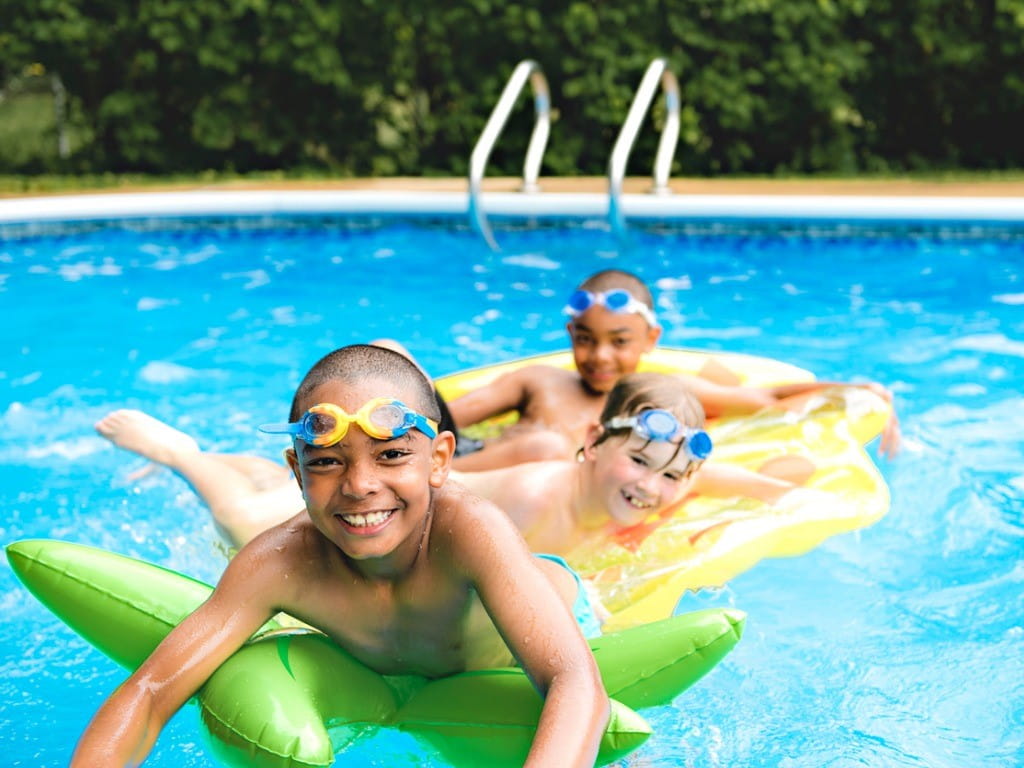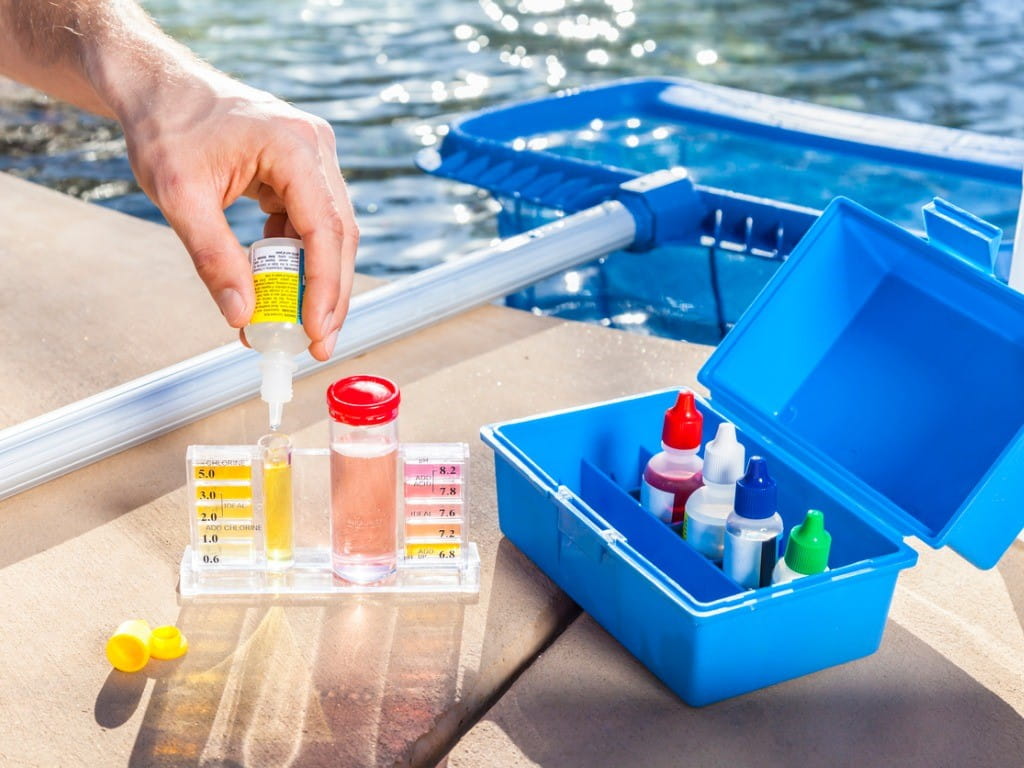What to Know About Chlorine Safety

The Bottom Line
Chlorinating products for home swimming pools are generally safe for swimmers when used properly. The key to avoiding injury at the pool is prevention. Make sure to follow all the safety rules at the pool, as well as the instructions for handling all pool chemicals.

How does pool chlorine work?
Home pool chlorinating agents are either inorganic (such as sodium or calcium hypochlorite) or organic (such as chlorinated isocyanurates like trichloroisocyanuric acid or potassium dichloroisocyanurate). When added to pool water, chlorine forms hypochlorous acid. This weak acid can kill bacteria and some viruses, keeping the pool safe to use. Home pool chlorinating products are easy to use, inexpensive, last a reasonable amount of time, and are effective germicides.
Pool owners must keep the chlorine concentration within a range that is high enough to effectively kill germs yet low enough to avoid injury to swimmers. The CDC recommends keeping a free chlorine concentration of at least 1 ppm in pools and 3 ppm in hot tubs. Regular use of home testing kits is an important part of responsible pool ownership. Maintaining an optimal pH also contributes to protecting swimmers from the spread of germs in pool water.
Why does chlorine smell so strong?
The strong odor is not actually from chlorine. When chlorine is added to a pool, it mixes with other things in the water, particularly from swimmers themselves (such as sweat, dirt, skin cells, and yes, even urine and feces). The mixing of chlorine and these compounds creates chloramines. Chloramines are smelly irritants formed from the reaction of mixing the free chlorine and amine groups from organic matter. A well-maintained pool should not be a smelly pool.Are pool fumes safe to inhale?
Chloramine irritation of the respiratory tract causes coughing and trouble breathing. Because chloramine gas is heavier than air, it settles on top of the water, making it problematic for both swimmers and those nearby. It can be especially troublesome for people who spend many hours in a pool (such as competitive swimmers) or those with pre-existing health problems (such as a chronic lung disease). Indoor pools increase the risk of experiencing irritation from the accumulation of these fumes because of limited ventilation.Is chlorine bad for your eyes or skin?
If the pH (acidity) or chlorine concentration of the pool water is outside of the recommended range, it can sometimes cause mild irritation to the skin and eyes of swimmers. The longer the exposure, the greater the likelihood of irritation. Wearing swim goggles can reduce the risk of eye irritation.
Occasionally, a pool owner must add substantially more chlorinating product to the pool to offset the buildup of organic material. This process is called shocking, and many pool owners do it at night when the pool is unoccupied. You should not re-enter a pool after it has been shocked until testing shows that the chlorine concentration has returned to its usual level.
Is it safe to drink chlorinated water?
Unintentionally swallowing a small amount of pool water is fine, but it is best to avoid drinking large amounts because it means being exposed to all the bad things that the pool chlorination is trying to control, like bacteria. The chemicals in pool water can cause burning sensations in the mouth and throat, as well as nausea, vomiting, and diarrhea.What to do if you’re experiencing discomfort from pool chemicals
If you or someone you know starts feeling irritation from the fumes, immediately move away from the water and into fresh air. If there is irritation of the skin, rinsing off in a shower should help reduce discomfort. If your eyes experience redness and burning from direct exposure, irrigation with water in a shower or at an eye station for 15 minutes is recommended.
If anyone starts having trouble breathing, shortness of breath, wheezing, chest tightness, or any persistent pain or discomfort of the skin or eyes, seek medical attention immediately. These symptoms can be addressed at an urgent care center or an emergency room with a breathing treatment and further eye irrigation.
If you are worried about exposure to a pool chlorinating agent, check the webPOISONCONTROL online tool for guidance or call Poison Control at 1-800-222-1222. Whether you log on or call, expert assistance is available 24 hours a day.
Kristina Yee, PharmD, BS
Certified Specialist in Poison Information
Revised William G. Troutman, PharmD
Professor of Pharmacy Emeritus
Poison Control Media Information
Did you find this page helpful? If so, we need your support. Poison Control is in constant competition with misinformation online. Links to www.poison.org or our webPOISONCONTROL triage tool from other websites and blogs help internet searchers quickly find accurate information and Poison Control’s contact information in an emergency. If you use the content from this page, please provide attribution via a link back to this page, www.poison.org, or https://triage.webpoisoncontrol.org/#!/exclusions. By doing so, you could save a life. Thank you!
Poisoned?
Call 1-800-222-1222 or
Prevention Tips
- Use chlorinating agents as instructed by the product instructions.
- Ensure adequate ventilation for indoor pools and hot tubs.
- Use test kits frequently to keep chlorine and pH levels within recommended ranges.
- Store all pool chemicals in temperature-controlled environments and away from public access, direct sunlight, and water.
- Always wear personal protective equipment (such as gloves and goggles) when handling pool chemicals.
- Do not go into the water if you have diarrhea.
- Do not urinate or defecate in the pool.
This Really Happened
A 46-year-old man came to an emergency room (ER) after unintentionally inhaling dust from pool chlorinating tablets he was using for his own pool. He had a history of asthma and was having trouble breathing and shortness of breath. The ER physician called Poison Control for recommendations. Poison Control recommended oxygen, bronchodilators, and respiratory support as needed until the man’s breathing returned to normal. The man's symptoms resolved after a couple of nebulizer treatments, and he was discharged within a few hours.For More Information
Healthy swimming. US Centers for Disease Control and Prevention. Accessed August 30, 2024.
References
Poisoned?
Call 1-800-222-1222 or
Prevention Tips
- Use chlorinating agents as instructed by the product instructions.
- Ensure adequate ventilation for indoor pools and hot tubs.
- Use test kits frequently to keep chlorine and pH levels within recommended ranges.
- Store all pool chemicals in temperature-controlled environments and away from public access, direct sunlight, and water.
- Always wear personal protective equipment (such as gloves and goggles) when handling pool chemicals.
- Do not go into the water if you have diarrhea.
- Do not urinate or defecate in the pool.
